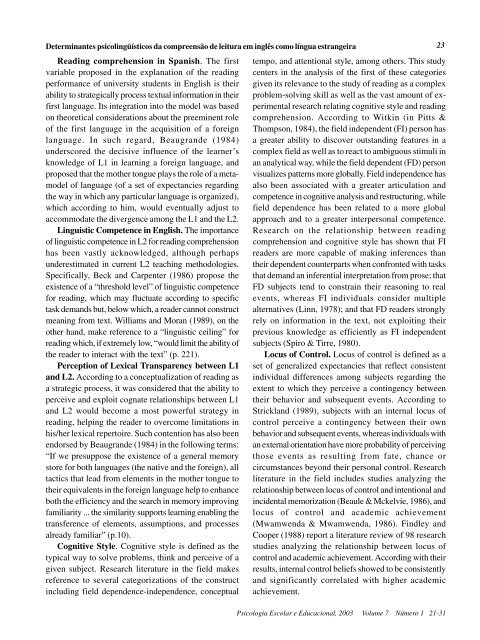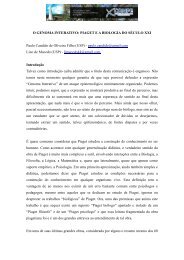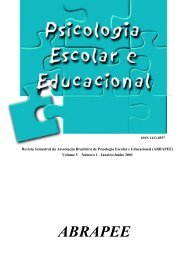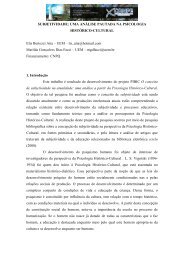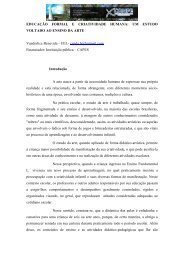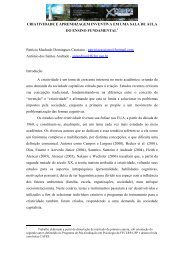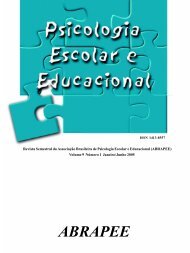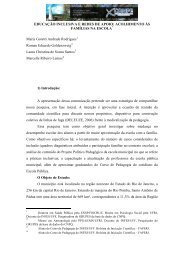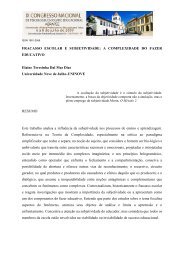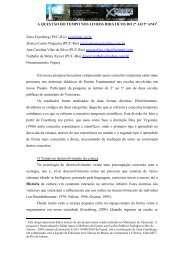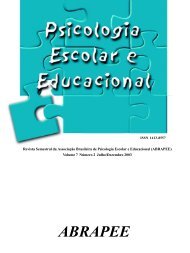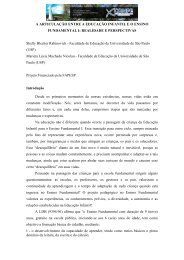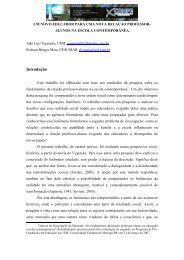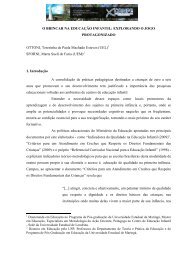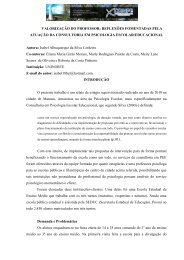22Javier Vivaldo-Lima M.A., Miguel López-Olivas PhD. e Rosa Obdulia González-Robles M.Sc.first language (L1) to the study of reading proces<strong>se</strong>s inforeign languages (L2) with specific reference to thedevelopment of reading comprehension models, theformulation of re<strong>se</strong>arch hypothesis, and the <strong>se</strong>lection ofrelevant instructional methodologies. They contend thatalth<strong>ou</strong>gh the reader’s linguistic competence in L2 mayplay an important role in the construction of meaningfrom text in a foreign language, it is not necessarily themain determinant, considering the facilitation effectassociated with the reader’s knowledge of the linguisticsystem of the L1 and its strategic application.The problemA constant f<strong>ou</strong>nd among students registered inreading comprehension c<strong>ou</strong>r<strong>se</strong>s in English at theUniversidad Autónoma Metroplitana in Mexico is theirwide variation in reading achievement, variation that cannot be uniquely associated with deficits in linguisticcompetence in L2. That is, alth<strong>ou</strong>gh most of <strong>ou</strong>r student<strong>se</strong>nter with a limited linguistic competence in English,some of them eventually develop powerful readingcomprehension strategies, and achieve an efficientcomprehension of textual information in L2, thusovercoming their original linguistic limitations. However,ca<strong>se</strong>s of students with rigid and inefficient text processingstrategies are invariably detected, most of them showinga lack of ability to integrate to their reading repertoiresstrategies which demand a flexible and interactiveprocessing of information.Hence, and alth<strong>ou</strong>gh the utmost importance oflinguistic determinants for L2 reading comprehension isacknowledged, this study is ba<strong>se</strong>d on the assumptionthat the construction of meaning from text in a foreignlanguage may also be determined by psychologicalfactors associated with the reader’s perceptual, cognitiveand volitional orientation. In such regard, the mainpurpo<strong>se</strong> of this study is to validate a multivariate modelof reading comprehension in L2 integrated by two mainexplanatory dimensions of analysis: the linguistic and thepsychological.text) and internal information (cognitive presuppositions).Disc<strong>ou</strong>r<strong>se</strong> is analyzed from the word as the basic unit atthe lower level to whole themes as units at the higherlevel, with a continu<strong>ou</strong>s interaction among different textprocessing levels. In their words: “The model movesfrom the comprehension of words to the comprehensionof clau<strong>se</strong>s in which words have different functions, andfrom there to complex <strong>se</strong>ntences, <strong>se</strong>ntence <strong>se</strong>quencesand whole textual structures, with a continu<strong>ou</strong>s feedbackexisting among less and more complex units ... insteadof operating with a conventional structural processingmodel we operate with a strategic model”(p. 10).The modelThe model evaluated in this study (figure 1) is ba<strong>se</strong>don the tenet that the variability ob<strong>se</strong>rved in academicreading comprehension in English in Mexican universitystudents can be acc<strong>ou</strong>nted for by the interaction of twolinguistic and psychological variables. The first dimensionof the model (linguistic) is threefold and analy<strong>se</strong>s theimpact of (1) the reader’s strategies in his/her firstlanguage (Spanish), (2) his/her level of linguisticcompetence in the foreign language (English), and (3)his/her ability to perceive lexical transparency betweenboth languages (cognate perception). On the other hand,the psychological dimension, which is also threefold,evaluates the influence of the reader’s cognitive style,locus of control and action control orientation on her/hisconstruction of meaning from text.Conceptualization of the reading processThe theoretical approach to reading comprehensionthat underlies this re<strong>se</strong>arch is ba<strong>se</strong>d on the StrategicModel of Disc<strong>ou</strong>r<strong>se</strong> Processing developed by Van Dijkand Kintsch (1983). Disc<strong>ou</strong>r<strong>se</strong> processing isconceptualized as a strategic and interactive process inwhich the reader constructs a mental repre<strong>se</strong>ntation ofdisc<strong>ou</strong>r<strong>se</strong> in memory using both external information (theFigure 1: A multivariate model of linguistic and psychologicaldeterminants of reading. Original proposal.Following, a summarized revision of the variablesincorporated in the propo<strong>se</strong>d model is pre<strong>se</strong>nted in order toprovide a theoretical and re<strong>se</strong>arch backgr<strong>ou</strong>nd to the reader.
Determinantes psicolingüísticos da compreensão de leitura em inglês como língua estrangeira 23Reading comprehension in Spanish. The firstvariable propo<strong>se</strong>d in the explanation of the readingperformance of university students in English is theirability to strategically process textual information in theirfirst language. Its integration into the model was ba<strong>se</strong>don theoretical considerations ab<strong>ou</strong>t the preeminent roleof the first language in the acquisition of a foreignlanguage. In such regard, Beaugrande (1984)underscored the decisive influence of the learner’sknowledge of L1 in learning a foreign language, andpropo<strong>se</strong>d that the mother tongue plays the role of a metamodelof language (of a <strong>se</strong>t of expectancies regardingthe way in which any particular language is organized),which according to him, w<strong>ou</strong>ld eventually adjust toaccommodate the divergence among the L1 and the L2.Linguistic Competence in English. The importanceof linguistic competence in L2 for reading comprehensionhas been vastly acknowledged, alth<strong>ou</strong>gh perhapsunderestimated in current L2 teaching methodologies.Specifically, Beck and Carpenter (1986) propo<strong>se</strong> theexistence of a “threshold level” of linguistic competencefor reading, which may fluctuate according to specifictask demands but, below which, a reader cannot constructmeaning from text. Williams and Moran (1989), on theother hand, make reference to a “linguistic ceiling” forreading which, if extremely low, “w<strong>ou</strong>ld limit the ability ofthe reader to interact with the text” (p. 221).Perception of Lexical Transparency between L1and L2. According to a conceptualization of reading asa strategic process, it was considered that the ability toperceive and exploit cognate relationships between L1and L2 w<strong>ou</strong>ld become a most powerful strategy inreading, helping the reader to overcome limitations inhis/her lexical repertoire. Such contention has also beenendor<strong>se</strong>d by Beaugrande (1984) in the following terms:“If we presuppo<strong>se</strong> the existence of a general memorystore for both languages (the native and the foreign), alltactics that lead from elements in the mother tongue totheir equivalents in the foreign language help to enhanceboth the efficiency and the <strong>se</strong>arch in memory improvingfamiliarity ... the similarity supports learning enabling thetransference of elements, assumptions, and proces<strong>se</strong>salready familiar” (p.10).Cognitive Style. Cognitive style is defined as thetypical way to solve problems, think and perceive of agiven subject. Re<strong>se</strong>arch literature in the field makesreference to <strong>se</strong>veral categorizations of the constructincluding field dependence-independence, conceptualtempo, and attentional style, among others. This studycenters in the analysis of the first of the<strong>se</strong> categoriesgiven its relevance to the study of reading as a complexproblem-solving skill as well as the vast am<strong>ou</strong>nt of experimentalre<strong>se</strong>arch relating cognitive style and readingcomprehension. According to Witkin (in Pitts &Thompson, 1984), the field independent (FI) person hasa greater ability to discover <strong>ou</strong>tstanding features in acomplex field as well as to react to ambigu<strong>ou</strong>s stimuli inan analytical way, while the field dependent (FD) personvi<strong>sua</strong>lizes patterns more globally. Field independence hasalso been associated with a greater articulation andcompetence in cognitive analysis and restructuring, whilefield dependence has been related to a more globalapproach and to a greater interpersonal competence.Re<strong>se</strong>arch on the relationship between readingcomprehension and cognitive style has shown that FIreaders are more capable of making inferences thantheir dependent c<strong>ou</strong>nterparts when confronted with tasksthat demand an inferential interpretation from pro<strong>se</strong>; thatFD subjects tend to constrain their reasoning to realevents, whereas FI individuals consider multiplealternatives (Linn, 1978); and that FD readers stronglyrely on information in the text, not exploiting theirprevi<strong>ou</strong>s knowledge as efficiently as FI independentsubjects (Spiro & Tirre, 1980).Locus of Control. Locus of control is defined as a<strong>se</strong>t of generalized expectancies that reflect consistentindividual differences among subjects regarding theextent to which they perceive a contingency betweentheir behavior and sub<strong>se</strong>quent events. According toStrickland (1989), subjects with an internal locus ofcontrol perceive a contingency between their ownbehavior and sub<strong>se</strong>quent events, whereas individuals withan external orientation have more probability of perceivingtho<strong>se</strong> events as resulting from fate, chance orcircumstances beyond their personal control. Re<strong>se</strong>archliterature in the field includes studies analyzing therelationship between locus of control and intentional andincidental memorization (Beaule & Mckelvie, 1986), andlocus of control and academic achievement(Mwamwenda & Mwamwenda, 1986). Findley andCooper (1988) report a literature review of 98 re<strong>se</strong>archstudies analyzing the relationship between locus ofcontrol and academic achievement. According with theirresults, internal control beliefs showed to be consistentlyand significantly correlated with higher academicachievement.<strong>Psic</strong>ologia Escolar e Educacional, 2003 Volume 7 Número 1 21-31
- Page 1 and 2: ISSN 1413-8557Revista Semestral da
- Page 3 and 4: Psicologia Escolare EducacionalISSN
- Page 5 and 6: SUMMARYISSN 1413-85577 EditorialPap
- Page 7 and 8: EDITORIALAs perspectivas da psicolo
- Page 9: Artigos
- Page 12 and 13: 12iniciando pela teoria do Ensino p
- Page 14 and 15: 14Clara Vasconcelos, João Félix P
- Page 16 and 17: 16refletem a idéia de que a aprend
- Page 18 and 19: 18REFERÊNCIASAlmeida, L. S. (1996)
- Page 21: Psicologia Escolar e Educacional, 2
- Page 25 and 26: Determinantes psicolingüísticos d
- Page 27 and 28: Determinantes psicolingüísticos d
- Page 29 and 30: Determinantes psicolingüísticos d
- Page 31: Determinantes psicolingüísticos d
- Page 34 and 35: 34 Geraldina Porto Wittercolonial.
- Page 36 and 37: 36 Geraldina Porto WitterComo lembr
- Page 38 and 39: 38 Geraldina Porto Witterde remedia
- Page 40 and 41: são é pelo menos apressada, em ce
- Page 42 and 43: 42 Geraldina Porto Witter13.808 pro
- Page 44 and 45: 44 Geraldina Porto WitterÉ uma pro
- Page 46 and 47: 46 Geraldina Porto WitterSaigh, P.
- Page 48 and 49: 48 Ana Paula Porto Noronha, Flávia
- Page 50 and 51: 50 Ana Paula Porto Noronha, Flávia
- Page 52 and 53: 52 Ana Paula Porto Noronha, Flávia
- Page 54 and 55: 54 Ana Paula Porto Noronha, Flávia
- Page 56 and 57: 56 Ana Paula Porto Noronha, Flávia
- Page 58 and 59: 58 Neusa Haruka Sezaki Grittide lí
- Page 60 and 61: 60 Neusa Haruka Sezaki GrittiT 2e T
- Page 62 and 63: 62 Neusa Haruka Sezaki GrittiO tota
- Page 64 and 65: 64 Neusa Haruka Sezaki Gritticonsid
- Page 66 and 67: 66 Neusa Haruka Sezaki Grittite, co
- Page 68 and 69: 68 Neusa Haruka Sezaki GrittiREFER
- Page 70 and 71: 70 Lílian Pacheco e Fermino Fernan
- Page 72 and 73:
72 Lílian Pacheco e Fermino Fernan
- Page 74 and 75:
74 Lílian Pacheco e Fermino Fernan
- Page 76 and 77:
76 Lílian Pacheco e Fermino Fernan
- Page 78 and 79:
78 Miriam Cruvinel e Evely Boruchov
- Page 80 and 81:
80 Miriam Cruvinel e Evely Boruchov
- Page 82 and 83:
82 Miriam Cruvinel e Evely Boruchov
- Page 84 and 85:
84 Miriam Cruvinel e Evely Boruchov
- Page 86 and 87:
86 Patrícia Fernanda Carmem Kebach
- Page 88 and 89:
88 Patrícia Fernanda Carmem Kebach
- Page 90 and 91:
90 Patrícia Fernanda Carmem Kebach
- Page 92 and 93:
92 Patrícia Fernanda Carmem Kebach
- Page 94 and 95:
94 Patrícia Fernanda Carmem Kebach
- Page 96 and 97:
96 Patrícia Fernanda Carmem Kebach
- Page 98 and 99:
98primeira parte, a autora apresent
- Page 100 and 101:
100 HistóriaPsicologia Escolar, ex
- Page 103 and 104:
Sugestões PráticasSEXUALIDADE E E
- Page 105 and 106:
InformativoNOTÍCIAS BIBLIOGRÁFICA
- Page 107 and 108:
Informativo 107I CONGRESSO NACIONAL
- Page 109 and 110:
Informativo 1091.2. Sugestão de t
- Page 111 and 112:
Informativo 111Tipos Comuns de Cita
- Page 113 and 114:
Informativo 113No texto, citar o an
- Page 115:
FORMULÁRIO PARA PAGAMENTO DA ANUID


